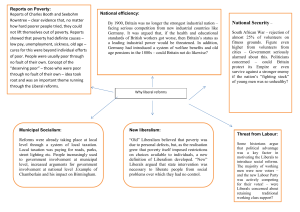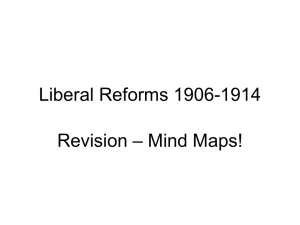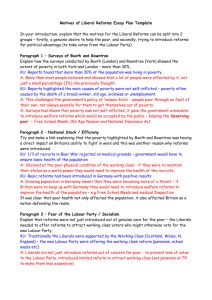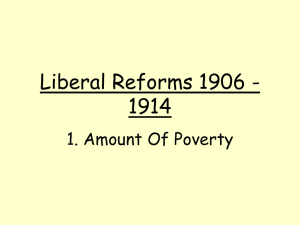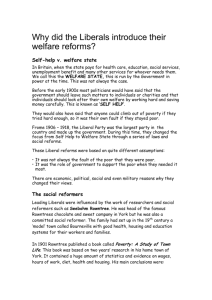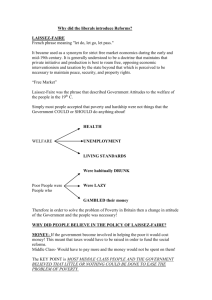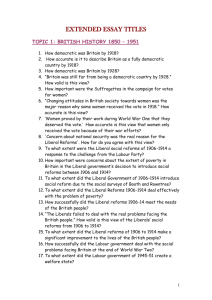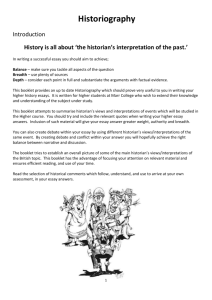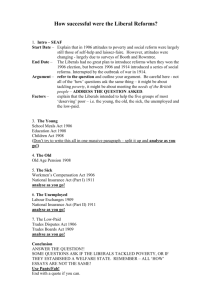Liberal reforms - This area is password protected
advertisement
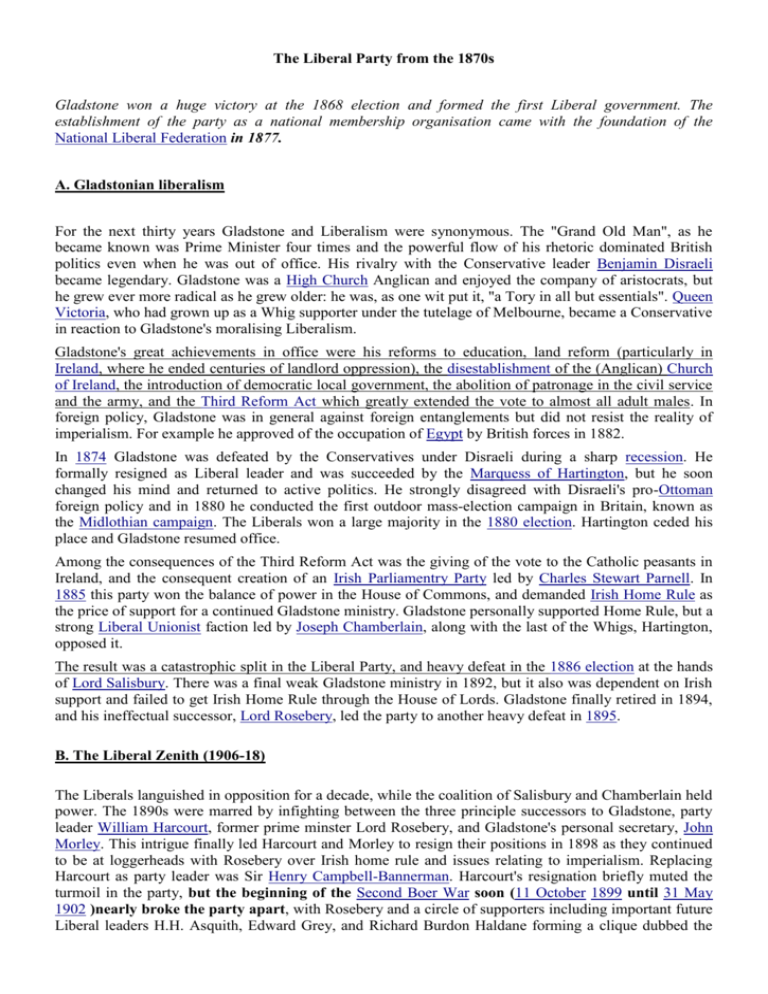
The Liberal Party from the 1870s Gladstone won a huge victory at the 1868 election and formed the first Liberal government. The establishment of the party as a national membership organisation came with the foundation of the National Liberal Federation in 1877. A. Gladstonian liberalism For the next thirty years Gladstone and Liberalism were synonymous. The "Grand Old Man", as he became known was Prime Minister four times and the powerful flow of his rhetoric dominated British politics even when he was out of office. His rivalry with the Conservative leader Benjamin Disraeli became legendary. Gladstone was a High Church Anglican and enjoyed the company of aristocrats, but he grew ever more radical as he grew older: he was, as one wit put it, "a Tory in all but essentials". Queen Victoria, who had grown up as a Whig supporter under the tutelage of Melbourne, became a Conservative in reaction to Gladstone's moralising Liberalism. Gladstone's great achievements in office were his reforms to education, land reform (particularly in Ireland, where he ended centuries of landlord oppression), the disestablishment of the (Anglican) Church of Ireland, the introduction of democratic local government, the abolition of patronage in the civil service and the army, and the Third Reform Act which greatly extended the vote to almost all adult males. In foreign policy, Gladstone was in general against foreign entanglements but did not resist the reality of imperialism. For example he approved of the occupation of Egypt by British forces in 1882. In 1874 Gladstone was defeated by the Conservatives under Disraeli during a sharp recession. He formally resigned as Liberal leader and was succeeded by the Marquess of Hartington, but he soon changed his mind and returned to active politics. He strongly disagreed with Disraeli's pro-Ottoman foreign policy and in 1880 he conducted the first outdoor mass-election campaign in Britain, known as the Midlothian campaign. The Liberals won a large majority in the 1880 election. Hartington ceded his place and Gladstone resumed office. Among the consequences of the Third Reform Act was the giving of the vote to the Catholic peasants in Ireland, and the consequent creation of an Irish Parliamentry Party led by Charles Stewart Parnell. In 1885 this party won the balance of power in the House of Commons, and demanded Irish Home Rule as the price of support for a continued Gladstone ministry. Gladstone personally supported Home Rule, but a strong Liberal Unionist faction led by Joseph Chamberlain, along with the last of the Whigs, Hartington, opposed it. The result was a catastrophic split in the Liberal Party, and heavy defeat in the 1886 election at the hands of Lord Salisbury. There was a final weak Gladstone ministry in 1892, but it also was dependent on Irish support and failed to get Irish Home Rule through the House of Lords. Gladstone finally retired in 1894, and his ineffectual successor, Lord Rosebery, led the party to another heavy defeat in 1895. B. The Liberal Zenith (1906-18) The Liberals languished in opposition for a decade, while the coalition of Salisbury and Chamberlain held power. The 1890s were marred by infighting between the three principle successors to Gladstone, party leader William Harcourt, former prime minster Lord Rosebery, and Gladstone's personal secretary, John Morley. This intrigue finally led Harcourt and Morley to resign their positions in 1898 as they continued to be at loggerheads with Rosebery over Irish home rule and issues relating to imperialism. Replacing Harcourt as party leader was Sir Henry Campbell-Bannerman. Harcourt's resignation briefly muted the turmoil in the party, but the beginning of the Second Boer War soon (11 October 1899 until 31 May 1902 )nearly broke the party apart, with Rosebery and a circle of supporters including important future Liberal leaders H.H. Asquith, Edward Grey, and Richard Burdon Haldane forming a clique dubbed the "Liberal Imperialists" that supported the government in the prosecution of the war. On the other side, more radical members of the party formed a Pro-Boer faction that denounced the conflict and called for an immediate end to hostilites. Quickly rising to prominence among the Pro-Boers was David Lloyd George, a relatively new MP and master of rhetoric and demagoguery that took advantage of having a national stage to speak out on a controversial issue to begin his rise to stardom in the party. Harcourt and Morley also sided with this group, though with slightly different aims. Campbell-Bannerman tried to keep these forces together at the head of a moderate Liberal rump, but in 1901 he delivered a speech on the government's "methods of barbarism" in South Africa that pulled him further to the left and nearly tore the party in two. The party was saved after Salisbury's retirement in 1902 when his successor, Arthur Balfour, pushed a series of unpopular initiatives such as a new education bill and Joseph Chamberlain called for a new system of protectionist tariffs. Campbell-Bannerman was able to rally the party around the traditional liberal platform of free trade and land reform and lead them to the greatest election victory in their history (1906) This would prove the last time the Liberals won a majority in their own right. Although he presided over a large majority, Sir Henry Campbell-Bannerman was overshadowed by his ministers, most notably Herbert Henry Asquith at the Exchequer, Edward Grey at the Foreign Office, Richard Burdon Haldane at the War Office and David Lloyd George at the Board of Trade. An ill Campbell-Bannerman retired in 1908 and died later that year. He was succeeded by Asquith, who stepped up the government's radicalism. Lloyd George succeeded Asquith at the Exchequer, and was in turn succeeded at the Board of Trade by Winston Churchill, a recent defector from the Conservatives. The Liberals pushed through much legislation, including the regulation of working hours, national insurance and welfare. It was at this time that a political battle over the so-called People's Budget resulted in the passage of an act ending the power of the House of Lords to block legislation. The cost was high, however, as the government needed to call two general elections in 1910 to validate its position and ended up frittering away most of its large majority, being left once again dependent on the Irish Nationalists. As a result Asquith was forced to introduce a new third Home Rule bill in 1912. Since the House of Lords no longer had the power to block the bill, the Unionist's Ulster Volunteer Force led by Sir Edward Carson, launched a campaign of opposition that included the threat of armed resistance in Ulster and the threat of mutiny by army officers in Ireland in 1914 (see Curragh Incident). In their resistance to Home Rule the Ulster Protestants had the full support of the Conservatives, whose leader, Andrew Bonar Law, was of Ulster-Scots descent. The country seemed to be on the brink of civil war when World War I broke out in August 1914. The war struck at the heart of everything British Liberals believed in. Several Cabinet ministers resigned, and Asquith, the master of domestic politics, proved a poor war leader. Lloyd George and Churchill, however, were zealous supporters of the war, and gradually forced the old pacifist Liberals out. The poor British performance in the early months of the war forced Asquith to invite the Conservatives into a coalition (on 17th May, 1915). This marked the end of the last all-Liberal government. This coalition fell apart at the end of 1916, when the Conservatives withdrew their support from Asquith and gave it to Lloyd George instead, who became Prime Minister at the head of a coalition government largely made up of Conservatives. Asquith and his followers moved to the opposition benches in Parliament and the Liberal Party was split once again. C. Liberal reforms (From Wikipedia) The Liberal reforms (1906-1914) collectively describes social legislation passed by the British Liberal Party after the 1906 General Election. It has been argued that this legislation shows the emergence of the modern welfare state. The reforms show a change in the attitude of the Liberal Party towards poverty. They shifted their outlook from laissez-faire system to a more collectivist system.[2] The reforms demonstrate the shift of the Liberal Party from a party of small government and classical liberalism to a party of progressive liberalism and larger, more active government. The Liberal welfare reforms took place after a Royal Commission on how the countries Poor Law provision should be altered. Two contrasting reports known as the Majority report and the Minority Report were published, and as they differed so greatly the Liberals were able to ignore both reports and implement their own reforms. By implementing the reforms outside of the Poor Law the stigma attached to claiming relief was also removed. During the 1906 General Election campaign none of the parties made poverty an election issue and no promises were made to introduce welfare reforms. Despite this the Liberals led by Henry CampbellBannerman won a landslide victory and began introducing wide ranging reforms as soon as they took office. Reasons for the Liberal reforms 1) The rise of progressive liberalism within the Liberal Party. Before this period classical liberalism had been the dominant ideology within the party. Classical liberalism emphasised a laissez-faire system of government to protect liberty. Progressive liberalism was an ideology which promoted state intervention - several 'New Liberals' such as David Lloyd George and Winston Churchill replaced the earlier ideology apparent in figures such as William Gladstone (see Gladstonian Liberalism) who felt that people should be more self reliant. 2) The writings of Charles Booth and Benjamin Seebohm Rowntree. These writers helped change attitudes towards the causes of poverty. Booth carried out extensive research into the poor living conditions and poverty experienced in London (Booth investigated poverty in London working with a team of investigators which included his cousin Beatrice Potter. This research which looked at incidences of pauperism in the East End of London showed that 35% were living in abject poverty - even higher than the original figure. This work was published under the title Labour and Life of the People in 1903) whilst Rowntree made a social investigation into the problems experienced by the poor in York. (First York study (1899 )Rowntree investigated poverty in York, inspired by the work of his father Joseph Rowntree and the work of Charles Booth in London. He carried out a comprehensive survey into the living conditions of the poor in York during which investigators visited every working class home. This amounted to the detailed study of 11,560 families or 46,754 individuals.] The results of this study were published in 1901 in his book Poverty, A Study of Town Life. In Rowntree's work, he surveyed poor families in York and drew a poverty line in terms of a minimum weekly sum of money "necessary to enable families... to secure the necessaries of a healthy life" (quoted in Coates and Silburn, 1970). The money needed for this subsistence level of existence covered fuel and light, rent, food, clothing, and household and personal items, adjusted according to family size. He determined this level using scientific methods which hadn’t been applied to the study of poverty before. For example he consulted leading nutritionists of the period to discover the minimum calorific intake and nutritional balance necessary before people got ill or lost weight. He then surveyed the prices of food in York to discover what the cheapest prices in the area for the food needed for this minimum diet were and used this information to set his poverty line. According to this measure, 27.84 percent of the total population of York lived below the poverty line.[5] This result corresponded with that from Charles Booth’s study of poverty in London and so challenged the view, commonly held at the time, that abject poverty was a problem particular to London and was not widespread in the rest of Britain. He placed those below his poverty line into two groups depending on the reason for their poverty. Those in primary poverty did not have enough income to meet the expenditure necessary for their basic needs. Those classed as in secondary poverty had high enough income to meet basic needs but this money was being spent elsewhere so they were unable to then afford the necessities of life. In analysing the results of the investigation he found that people at certain stages of life, for example in old age and early childhood, were more likely to be in abject poverty, living below the poverty line, then at other stages of life. From this he formulated the idea of the poverty cycle [7] in which some people moved in and out of absolute poverty during their lives. Rowntree's argument that poverty was the result of low wages went against the traditionally held view that the poor were responsible for their own plight These investigations provided statistical evidence for genuine moral concern for the poor. They stated that illness and old age were greater causes of poverty than idleness and moral weakness. Rowntree was himself a close friend of Lloyd George, after the two met in 1907 after Lloyd George became President of the Board of Trade. Rowntree himself hoped that his proposals could influence Liberal policy. 3) The threat from the emerging Labour Party. Socialism was an increasingly popular ideology; if the Liberals did not put forward popular policies, they were in danger of losing votes and handing the House of Commons to the Conservatives. 4) The trade union movement was growing especially during the period 1910-1912. Unless living conditions were improved there were genuine concerns that workers may turn to communism or rebellion. 4)The fact that the Liberals had to form a coalition government with the Labour Party after the 1910 General Election meant that further legislation was passed, since the Labour Party was allied to workers and socialists through the affiliated trade unions. 5) Germany and the USA were overtaking Britain as economic powers - the success of social legislation in Bismarck's Germany made leading Liberals in the UK such as David Lloyd George and Winston Churchill want to put forward similar legislation. The emergence of public works schemes set up to improve living conditions which were often run by the Liberals raised the possibility that such schemes could occur on a national scale. Social legislation passed by the previous Conservative government The Conservative government in office before the Liberals came to power passed the Unemployed Workman's Act in 1903 and the Employment of Children Act in 1905. Slum housing was also cleared for new houses to be built. Much of this legislation was left for local authorities to implement - their attitudes affected whether legislation was fully implemented.[7] The Conservatives also set up a Royal Commission to enquire into the workings of the Poor Law. Liberal reforms 1906-1914 Children In 1906 Children were provided with free school meals and in 1908 the Children and Young Person's Act formed part of the Children's Charter which imposed punishments for those neglecting children. It became illegal to sell children tobacco and alcohol or to send children begging. Juvenile courts and borstals were created instead for young offenders so they did not have to stand in adult courts and go to adult prisons for most offences.[8] It was not until 1912 that medical treatment was available even though the medical inspections began in 1907. Education authorities largely ignored the provision of free medical treatment for school children.[8] The provision of free school meals was made compulsory in 1914- in which year fourteen million were served, most free.. In 1912, half of all councils in Britain were offering the scheme. Elderly In 1908 pensions were introduced for the over 70s. This paid 5s a week (25p in today's money to single men and women and 7s 6d to married couples, on a sliding scale. The single persons rate applied to those over 70 earning under £21, this sum could be collected at the local post office.[10] The pensions were means-tested (to receive the pension one had to earn less than £31.50 annually) and intentionally low to encourage workers to make their own provisions for the future and those that had failed to work during their lives received nothing at all. To be eligible you also would have had to live in the country for 20 years or more. Workers In 1909 labour exchanges were set up help unemployed people find work, by providing centres where a large amount of employers and the unemployed to post jobs and apply for them. The National Insurance Act (Part I) passed in 1911 gave workers the right to sick pay of 10s a week and free medical treatment in return for a payment for 4d . The National Insurance Act (Part II) gave workers the right to unemployment pay of 7s 6d a week for 15 weeks in return for a payment of 2½d a week. The government also set up work exchange posts where the unemployed or underemployed could look for a job. In 1913 labour exchanges were putting 3000 into a job every day Health Insurance Under Part 1 of the 1911 National Insurance Act compulsory health insurance was provided for workers earning less than £160 per year. The scheme was contributed to by the worker who contributed fourpence, the employer who contributed threepence and the government who contributed twopence. The scheme provided sickness benefit entitlement of nine shillings (45 pence), free medical treatment and maternity benefit of 30 shillings (£1.50) Unemployment insurance Under Part 2 of the 1911 National Insurance Act which dealt with unemployment insurance most insured workers were given seven shillings (35 pence) unemployment benefit which could be claimed for up to 15 weeks. This scheme was also financed through the contributions of workers and government. People's Budget and the 1909 constitutional crisis The Liberal reforms were funded by David Lloyd George passing his controversial People's Budget which heavily taxed the rich in order to pay for welfare solutions for the poor. The budget met opposition in the House of Lords and passed with a Parliament Act to limit the powers of the Lords over the Commons. The crisis led to the Liberals losing their majority in the House of Commons and relying on the support of the small number of Labour and Irish nationalist MPs. Lloyd George argued that his budget would eliminate poverty, while trying to get the Act passed he gave this speech outlining his reasons for supporting the reforms: "This is a war Budget. It is for raising money to wage implacable warfare against poverty and squalidness. I cannot help hoping and believing that before this generation has passed away, we shall have advanced a great step towards that good time, when poverty, and the wretchedness and human degradation which always follows in its camp, will be as remote to the people of this country as the wolves which once infested its forests". Reforms after 1910 After 1910 the Liberal Party did not have a majority in the House of Commons and so entered into a coalition with 42 Labour Party MPs who had been elected. This led to further reforms as the Liberals required Labour support and Irish support to remain in office. Limitations of the reforms While the Liberal reforms were one of Britain's most ambitious welfare reform programmes, there were several limitations to the reforms they passed. Free school meals were not compulsory. Pensions were refused to those who had not been in work most of their life and the labour exchange programme often managed to find people only part-time casual work. The poor had to pay National Insurance Contributions out of their wages and the 7s 6d was not enough to live on. Dole and sickness pay also only lasted for a limited time. Free medical care was available to only a wage-earner, not the wife or children. Contemporary criticism of the Liberal reforms The Liberal reforms received criticism from those who saw this level of government intervention in people's lives as preventing self-help. The cost of the reforms was also criticised and there were also critics who suggested that the reforms would not work in practice. There were classical liberals who opposed this growing state intervention. Harold Cox, elected as a Liberal in 1906, was almost alone among Liberal MPs in opposing these reforms. He considered them to be eroding freedom and undermining individual responsibility. These ideological differences led him to resign his seat in 1909.[17] The Liberal journalist and editor of The Economist (1907-1916), F. W. Hirst, also opposed the reforms and the welfare state in general.[18] Some workers objected to paying 4d per week to the National Insurance contributions.[19] The chant "Taffy was a Welshman, Taffy was a thief" was chanted at Lloyd George by workers and referred to the suggestion that Welshman Lloyd George was taking their wages away from them.[20] However, Lloyd George responded with his famous phrase "Nine pence for four pence" which referenced to that fact that employers and the government were topping up the workers' contributions. Legislation included as part of the Liberal reforms 1906 Trade Disputes Act - ruled that unions could not be considered liable for damages because of strikes. 1906 Workmen's Compensation Act - Granted compensation for injury at work. 1906 Merchant Shipping Act 1906 Education (Provision of Meals) Act 1907 Education (Administrative Provisions) Act - created school medical inspections . 1908 Mines Act - Miners now worked 8 hour days. 1908 Children and Young Person's Act (Children's Charter) 1908 Old Age Pensions Act 1909 Labour Exchanges Act 1909 Trade Boards Act 1909 Housing and Town Planning Act 1911 National Insurance Act 1912 Minimum Wage Act (Miners) From 1911 MPs were also paid, meaning that it was much easier for working class people to stand for election (this had been a chartist claim, see People's Charter of 1838) The beginning of the welfare state? With the Beveridge Report (1942) and reforms of the Labour government under Clement Attlee (19451951) creating what would be considered the modern welfare state protecting citizens from "cradle to grave" it can be argued that the Liberal reforms show the emergence of the welfare state some forty years earlier. However, the Liberal reforms were not a preconceived welfare programme; it was more a response to political change (the newly enfranchised working classes and emerging Labour Party) and political factors such as the Boer War. The reforms were not collectivist in the sense that they relied on local government for implementation and still involved working with private insurance companies and Friendly Societies (sociétés d'entraide corporatistes) . The implementation of these reforms by local government was patchy. Only pensions were non-contributory (pas de cotisations) , the health and insurance reforms required contributions. Rosemary Ree's argues in Poverty and Public Health 1815-1948 that the reforms also contained an element of Victorian moral attitudes in that the reforms did not cater to sections of society considered undeserving of help. The reforms signalled a fundamental shift in attitudes towards poverty and the poor and the redistribution of wealth through higher taxation which occurred in Lloyd George's People's Budget would be repeated in Labour's reforms between 1945-1951.
